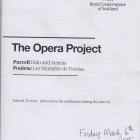Mamelles de Tirésias 2015Royal Conservatoire of Scotland
Read more about the opera Mamelles de Tirésias
Poulenc's ribald jazz-influenced farce has not been seen in Scotland for a while. The context of Apollinaire's text - the aftermath of the First World War - and the timing of Poulenc's setting (just after the Second), might make a serious approach expected. Not necessarily so!
This production presented the opera in a two-piano reduction, in a version given by the composer partnered by Benjamin Britten at Aldeburgh in 1958. It is hardly a surprise that this turned out to be a quite brilliant adaptation, and it was beautifully played by Marija Struckova and Michal Gajzler. This was a thoroughly satisfying feature of the revival in the intimacy of the Alexander Gibson Studio. Indeed it is almost difficult to imagine returning to the original full score, so easy is it for the singers to project detail in this context. Oliver Rundell, billed as 'Musical Director' was not visible, and had presumably done his work at the rehearsal stage.
As with the first half of the evening, the rather more sober Dido and Aeneas, the frame for the staging was minimalist - no set, just black draperies, with the two pianists, in formal evening dress, facing each other across the stage. They were each required to react occasionally to events on stage, but otherwise their role was discreet. The cast costumes were perhaps lacking in elegance, but then that is half the point - the policeman is attracted to the husband in spite of his obvious lack of femininity.
At the last of four performances, in a thoroughly relaxed artmosphere, several members of the audience were clearly friends or classmates of performers on stage, and their enjoyment initially threatened to get out of hand. However they soon controlled themselves, and there was only ever one moment when there seemed the possibility that a singer would 'corpse'. Fortunately he immediately regained control.
The work itself is a delightfully ribald and hilarious affair, at least in the right hands. It is possible to imagine a staging that would be heavy-handed. Here, however, everything went well. A risk was taken right at the start, with the performance by an excellent tenor, Matthew Thomas Morgan, of Poulenc's 1939 song Bleuet. This is a highly serious number relating to the loss of vast numbers of young soldiers in the First World War - French uniforms were blue - which clearly affected Apollinaire and Poulenc profoundly. The frivolous nature of much of the action did not prevent the composer from including some moving content, foretelling the style of music he would compose for Carmelites a decade later.
The longest role in the work - and it is a huge part - is that of the husband. At the fourth performance, Luke Sinclair scored something of a triumph. He sang beautifully from start to finish, acted with style, had no problems with his French diction - including some treacherous snatches of dialogue - and looked cheerfully grotesque in drag. The British theatrical equivalent must surely be Charley's Aunt, where a mediocre female impersonator is likewise irresistible to men.
The title role was taken with style by Barbara Cole Walton - it is one of those difficult, high-flying French coloratura parts, and she tackled it confidently. Among the others, all excellent, and distinctive, mention must be made of the hilarious tenor and baritone double-act of the two drunks, Presto and Lacouf, shooting one another with a pair of suitably vicious-looking baguettes. Then, after their recovery, they take part in a range of situations, including doing a hilarious turn as part of a trio of the husband's multitude of babies. But all the cast - policeman, journalist, theatre director and the rest, played their part in making this delightful work a welcome success.
Performance Cast
- Director of the Theatre
- Thérèse
- Husband
-
Jonathan Cooke (Mar 4, 6)
Luke Sinclair (Mar 5, 7)
- Presto a fat drunk
- Lacouf a thin drunk
- Gendarme
- Newspaper Vendor (Marchande des journaux)
- First Baby
- Second Baby
- Third Baby
- Journalist
- Son
- Elegant Lady a woman of Zanzibar (La dame elegante)
- Woman a woman of Zanzibar (La grosse dame)
- Bearded Gentleman a gentleman of Zanzibar (Le monsieur barbu)






